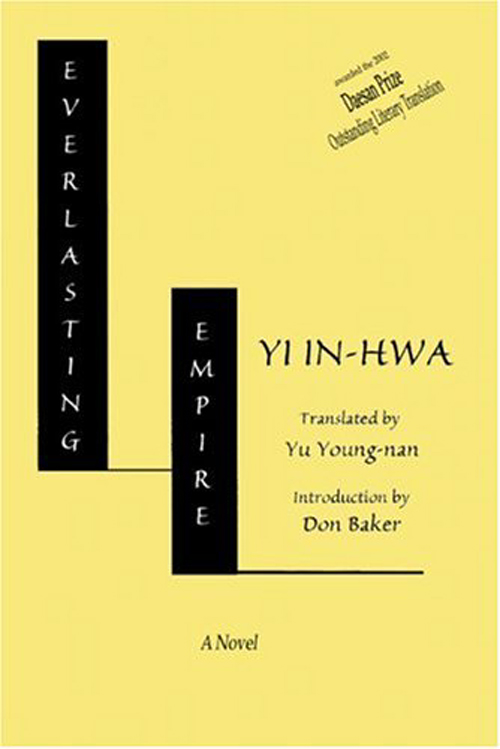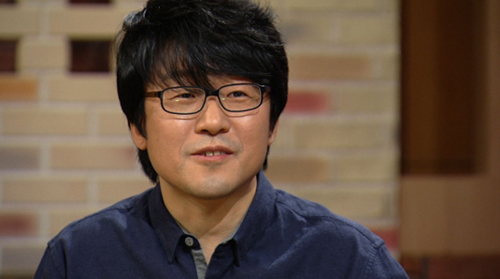Yi In-hwa’s full-length novel “Everlasting Empire” revolves around a suspicious murder that occurred at the royal palace at dawn on January 19, 1800, during late Joseon times.

In the process of cracking the murder case, the narrative exposes the conflict between two factions of the royal court.
The story is set in 18th century Joseon under the reign of its 22nd monarch, King Jeongjo (r. 1776-1800). The king attempts to strengthen royal authority but comes into conflict with opposition forces. Despite this unceasing opposition, the king pursues absolute royal power.
Jang Jong-oh is in charge of sorting out a series of records that list members of the opposition party involved in the death of Crown Prince Sado, the son of the 21st monarch, King Yeongjo (r. 1724-1776). He is found dead one day and the records he was tending disappeared. No evidence for homicide was found.
King Jeongjo calls in the head of the opposition party, Shin Hwan-ji, asking him to investigate the mysterious death. He asks his favorite courtier, Lee In-mong, who works at the royal Kyujanggak library, to go and find the lost records.
In the process, Lee realizes that the deceased man was murdered. More surprisingly, it turns out that behind the incident is the king himself, who plotted the whole scenario in pursuit of one goal: to annihilate his political opponents.
Since its publication in 1993, the “Everlasting Empire” has been widely read and has even been turned into a smash hit film.
“Although many people know about the king’s secret plot through either records or by word of mouth, not much of it was known at the time,” said author Yi In-hwa, whose real name is Ryu Chul-kyun. “I heard the story from my father when I was a kid and even in Andong, my father’s hometown, the old people often talked about it.”

Born in 1966 in Daegu, Yi earned both his bachelor’s and master’s degrees in Korean literature at Seoul National University. He made his literary debut as a literary critic in 1988 and started publishing a series of novels in 1992.
Some of his novels include “Who Is It That Can Tell Me Who I Am?” (1992), “The Path of the Human" (1997) and "The Fragrance of Grasslands" (1998).
He has also won numerous awards, including the first Writer’s World Literature Award, Today’s Young Scholarship Award, the first China-Korea Youth Scholarship Award and the Yi Sang Literary Award. The author currently serves as a professor at Ewha Womans University.
Don Baker, director and professor of Korean studies at the University of British Columbia, translated “Everlasting Empire” into English. Baker majored in Korean thought and religions. His first connection with Korea happened in 1971 when he was dispatched to Korea as a member of the Peace Corps.
Born in 1945 in Tampa, Florida, Baker got involved in the anti-apartheid movement in the 1960s. While attending Louisiana State University, he was even part of the campaign against the deployment of troops to the Vietnam War.
In his youth, Baker flew in to Gwangju, southern Korea, to teach English to middle-school students. Since then, the country of Korea has become the subject of his lifetime studies.
*This article has been made possible through the cooperation of the Literature Translation Institute of Korea.
By Sohn JiAe
Korea.net Staff Writer
jiae5853@korea.kr

Yi In-hwa’s 1993 novel “Everlasting Empire” is now published in English for a wider audience.
In the process of cracking the murder case, the narrative exposes the conflict between two factions of the royal court.
The story is set in 18th century Joseon under the reign of its 22nd monarch, King Jeongjo (r. 1776-1800). The king attempts to strengthen royal authority but comes into conflict with opposition forces. Despite this unceasing opposition, the king pursues absolute royal power.
Jang Jong-oh is in charge of sorting out a series of records that list members of the opposition party involved in the death of Crown Prince Sado, the son of the 21st monarch, King Yeongjo (r. 1724-1776). He is found dead one day and the records he was tending disappeared. No evidence for homicide was found.
King Jeongjo calls in the head of the opposition party, Shin Hwan-ji, asking him to investigate the mysterious death. He asks his favorite courtier, Lee In-mong, who works at the royal Kyujanggak library, to go and find the lost records.
In the process, Lee realizes that the deceased man was murdered. More surprisingly, it turns out that behind the incident is the king himself, who plotted the whole scenario in pursuit of one goal: to annihilate his political opponents.
Since its publication in 1993, the “Everlasting Empire” has been widely read and has even been turned into a smash hit film.
“Although many people know about the king’s secret plot through either records or by word of mouth, not much of it was known at the time,” said author Yi In-hwa, whose real name is Ryu Chul-kyun. “I heard the story from my father when I was a kid and even in Andong, my father’s hometown, the old people often talked about it.”

Author Yi In-hwa (captured image from KBS)
Born in 1966 in Daegu, Yi earned both his bachelor’s and master’s degrees in Korean literature at Seoul National University. He made his literary debut as a literary critic in 1988 and started publishing a series of novels in 1992.
Some of his novels include “Who Is It That Can Tell Me Who I Am?” (1992), “The Path of the Human" (1997) and "The Fragrance of Grasslands" (1998).
He has also won numerous awards, including the first Writer’s World Literature Award, Today’s Young Scholarship Award, the first China-Korea Youth Scholarship Award and the Yi Sang Literary Award. The author currently serves as a professor at Ewha Womans University.
Don Baker, director and professor of Korean studies at the University of British Columbia, translated “Everlasting Empire” into English. Baker majored in Korean thought and religions. His first connection with Korea happened in 1971 when he was dispatched to Korea as a member of the Peace Corps.
Born in 1945 in Tampa, Florida, Baker got involved in the anti-apartheid movement in the 1960s. While attending Louisiana State University, he was even part of the campaign against the deployment of troops to the Vietnam War.
In his youth, Baker flew in to Gwangju, southern Korea, to teach English to middle-school students. Since then, the country of Korea has become the subject of his lifetime studies.
*This article has been made possible through the cooperation of the Literature Translation Institute of Korea.
By Sohn JiAe
Korea.net Staff Writer
jiae5853@korea.kr